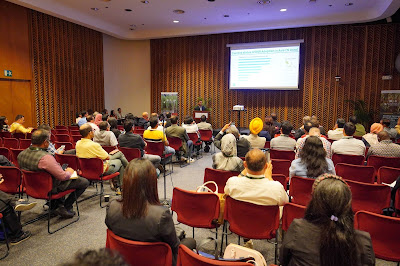Manila, Philippines (24 October 2023) — The potential and challenges of direct-seeded rice (DSR) were discussed by scientists and researchers at the Seeding Success: Mastering Direct-Seeded Rice Panel Workshop held during the recent 6th International Rice Congress.
The workshop aims to foster partnerships and collaborations to support ongoing research in DSR systems, address critical challenges, utilize breeding expertise for suitable varieties, emphasize agronomic interventions, promote knowledge sharing among participants, and inspire advocacy for DSR adoption among farmers, policymakers, and stakeholders.
Dr. Hans Bhardwaj, research director of the Rice Breeding Innovations Department at the Internationational Rice Research Institute (IRRI) and lead for CGIAR’s Global Rice Breeding Program, emphasized the importance of taking a deeper dive in DSR as a “system” and not as a single piece of innovation.
Dr. Virender Kumar, research leader at IRRI’s Climate-adaptive Agronomy & Mechanization and coordinator of the Direct Seeded Rice Consortium, presented the drivers behind the shift from traditional method of transplanting rice to DSR, its advantages, and key challenges which contribute to high carbon footprint and low farm efficiency in DSR cultivation.
Presenting highlights of breeding of rice varieties tailored for environment suitable for DSR was Dr. Shalabh Dixit, lead of the DSR breeding program. He emphasized key considerations and ongoing efforts in the global DSR landscape, including the DSR plant type, product concept for Latin Americas and the Carribean (LAC), and IRRI's DSR traits. He also outlined the IRRI DSR breeding network and the regions it covers.
The workshop aslo featured regional perspectives from Asia, Africa, and the Americas. IRRI breeding scientists Drs. Vikas K. Singh and Ajay Panchbhai presented current status of DSR, strategies and evidences of yield gain of the system versus transplanted rice Asia and Africa, respectively.
Dr. Maria Fernanda Alvarez from Alliance Biodiversity-CIAT focused on how DSR contributes to sustainability and plans forward across LAC. Dr. Alvarez mentioned what CIAT and Latin American Fund for Irrigated Rice can offer to the food systems which includes breeding, agronomy and capacity building.
One of the highlights of the event is the brainstorming session involving all participants and experts in DSR were present to exchange ideas and solutions on strategies on product advancement and varieties release and weed management, challenges on widespread adoption of DSR, and carbon footprint.
The workshop also addressed key traits, crop management, mechanization, low carbon seed system and policy related to DSR. The discussions focused on the management of biotic and abiotic stresses under direct-seeded systems, featuring IRRI scientists Dr. Van Schepler Luu and Dr. Amelia Henry, respectively. Agronomic considerations for improving yields and reducing risk under DSR were also discussed by Dr. P. Panneerselvam.
It also explored the latest advancements in machinery development for DSR, featuring insights from Engr. Princess Dela Cruz which offers a glimpse into future possibilities for DSR.
Dr. Ando Radanielson, on the other hand, provided insights on how to reduce the carbon footprint of rice production while increasing yield, profitability, and sustainability.
Dr. Kumar summarized the workshop's outcomes, emphasizing the need to synthesize the progress DSR has made and considering the capacity building across all the rice value chain actors especially the farmers to scale its reach. Dr. Kumar encouraged everyone to find a solution for labor and water shortage in rice production.
“We need to find a solution and DSR is a scalable solution,” he said.
“DSR if not adopted is going to affect rice industry in general; we have a lot of responsibility an that I’m sure that everybody's fully capable and we are going in the right directions,” said Dr. Dixit.
The workshop on direct-seeded rice provided a platform for experts to share their knowledge, exchange ideas, and work toward addressing the challenges associated with this innovative agricultural method. It is evident that DSR holds significant promise for sustainable agriculture but also requires a collaborative effort to overcome the obstacles that lie ahead.
###
Learn more about IRRI (www.irri.org) or follow us on social media and networks (all links down the right column).




No comments:
Post a Comment